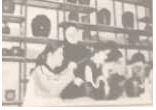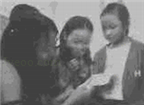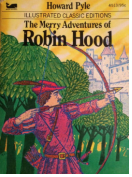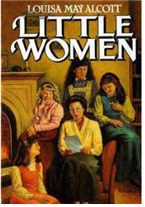Dereck and Beverly are wildlife animal filmmakers(电影制片人). They have made lots of films about animals and plants.
Their job is to keep and protect the big cats of Africa from damage(伤害). Beverly also takes photos of the lions and her pictures have appeared in National Geographic magazines.
When they were kids, Dereck was quiet and healthy, he was good at math and science. Beverly had a twin brother. At that time, her brother and she often got their mother into trouble! Beverly was a dancer, an athlete, played the piano (not very well), and was a class leader. Her favourite subject was science and she always got excellent grades in her science exams.
When in the field, their work starts at around 4 am. After drinking a cup of tea, they drive out into a bush(灌木丛)to find their subjects. Sometimes that is a lion pride(群). Lions are family animals, they usually live in groups of 15 or more. Sometimes that is a single leopard(花豹). They follow the animals for the day, filming, researching, and collecting facts, information or pictures. They don't stop working even when they have lunch. They are often back in camp by 8 pm.
When talking about the favourite places to explore, Dereck says, "We live in it!" Beverly thinks being in nature is her favourite. Dereck thinks running or taking a swim in the Okavango swamp(沼泽)﹣especially swimming close to crocodile(鳄鱼)is great fun, but Beverly says, "Swimming is fun but crazy in these waters."
(1)From the second paragraph, we can know when they were kids, .
A. Dereck was outgoing
B. Beverly was quiet and healthy
C. Beverly could play the piano very well
D. Dereck and Beverly were both good at science
(2)When Dereck and Beverly are in the field, the right time order(时间顺序)is that they
.
①drink a cup of tea②follow the animals③drive out ④find their subjects
A. ①②③④
B. ①④③②
C. ①③④②
D. ④①③②
(3)How many hours do they usually work every day?
A. Eight.
B. Ten.
C. Twelve.
D. Sixteen.
(4)What does the passage mainly talk about?
A. Animals and plants.
B. The story of Dereck and Beverly.
C. National Geographic magazines.
D. Dereck and Beverly's childhood.
(5)From the passage, we can infer(推断)that .
A. Dereck and Beverly don't love at all
B. Dereck and Beverly are famous film stars
C. it's safe to take a swim in the Okavango swamp
D. their work is dangerous sometimes, but they like it

Thanks to the ancient Silk Road, the lands of Italy and China have been connected for more than 2,000 years. Tourists from China and every corner of the world come to visit Italy every year. Here are four famous cities of Italy.
|
Rome Coliseum |
Rome is the birth place of science, culture and of course, art in Europe. It is the perfect combination(结合)of the modern and the classical. When one walks around the city, one can see many museums. Of course, Rome is also considered as the fashion(时尚)centre of the world now. The Rome Coliseum is today considered one wonder(奇迹)of the modern world. |
|
Pisa is a small city. It is famous for the leaning tower of Pisa. If you think that Pisa has only one leaning tower, you may just be wrong. This city has three leaning towers. Home of the famous scientist Galileo, Pisa is also known for its universities because the city is home of some of the most important universities in Europe. |
Leaning Tower |
|
David |
Florence is one of the most important provinces around Italy. Shopping here, you'll find David, the most famous statue(雕像)of Michelangelo. If you are planning to spend a couple of days in Florence, you likely will not want to lose the opportunity to see and enjoy Arnolfo Tower, it will be open on Sunday and Monday from 9 am to 6 pm.(closed in case of rain). |
|
Venice is a city over a hundred islands. You can visit most interesting places of the city by walks or by the famous gondolas. Art exhibitions, film festivals and famous carnival(狂欢节)make Venice a place that can be visited any time of the year. |
|
(1)According to the passage, is considered as a fashion center of the world now.
A. Rome
B. Pisa
C. Florence
D. Venice
(2)Pisa is also famous for its besides leaning towers.
A. universities
B. art exhibitions
C. film festivals
D. museums
(3)We can visit Arnolfo Tower .
A. at 8 am on Sunday
B. at 9 am on Tuesday
C. at 9 pm on Saturday
D. at 10 am on Monday
(4)According to the passage, which one of the following is NOT true?
A. Pisa has three leaning towers.
B. You'll find David when you go shopping in Florence.
C. You can visit most interesting places of Venice by walks or by bus.
D. Every year, thousands of tourists all over the world come to visit Italy.
(5)What is the best title of the passage?
A. Italy and China.
B. The ancient Silk Road.
C. All roads lead to Rome.
D. Four famous cities of Italy.
On April 19th, a pottery (陶器) exhibition was held at Wuhan Optical Experimental Valley School. Many pieces of pottery in different sizes were shown at the school. Some were a bit broken, but all of them were beautiful works of art created by the students.
At the end of last year, the school started a project that called on teachers to collect disused or broken pieces of pottery from the countryside. So far, they have collected about 3,000 pieces.
"Pottery used to play an important role in the daily lives of Chinese people." school head Ma Guoxin told the reporter. "By pottery painting, the students can improve themselves in many ways. They can better understand the history of the pottery, put their creativity into the pottery and show the love for life and beauty. "
Students turned the pottery into different works of art.They were all encouraged to paint pictures on the pottery, even though some students didn't know how to paint. Wang Zixuan, a student from Grade Eight, with little knowledge of painting, painted a beautiful night scenery on a piece of pottery. It was so nice that many students loved it.
Almost every classroom has coloured pieces of pottery. They are either used as flowerpots or pen containers(笔筒). The school has also set up several art corners to show the pottery. For example, the students have put up some pottery on bookcases outside of a lecture hall(报告厅) It has become an enjoyable place for students to rest and read.
(1)On April 19th, a exhibition was held at Wuhan Optical Valley Experiment School.
A. flower
B. film
C. pottery
D. costume
(2)According to the passage, were encouraged to paint the pottery.
A. the students who painted very well
B. the students who got good grades
C. the students who didn't know how to paint
D. all the students in the school
(3)By pottery painting, the students can improve themselves in many ways EXCEPT .
A. knowing how to collect pottery
B. better understanding the history of the pottery
C. putting their creativity into the pottery
D. showing the love for life and beauty
(4)According to the passage, which of the following is TRUE?
A. The school has collected about 2,000 pieces of pottery so far.
B. Wang Zixuan was a student from Grade Seven.
C. We can't find any coloured pottery in their classrooms.
D. The students enjoy resting and reading at the art corners.
(5). In which part of a newspaper can we read the passage?
A. Sports news.
B. Traditional art.
C. Healthy living.
D. Popular music.

"I am a selfish child.
I hope the sunshine lies only upon me, so I can feel its warmth.
I am a selfish child.
I hope there is a corner of the world that can comfortable for me when I am sad,
I am a selfish child.
I hope my mom belongs only to me, so I can enjoy the sweetness of love. "
This poem was written by a middle school student in a lonely mountains town in Yunnan Province during her first poetry class. The girl missed her mother, who died when she was 5.
Kang Yu, the teacher who taught the girl how to write the poem, graduated from Renmin University of China in Beijing in 2015.Soon after her gradation,Kang moved to a town in Yunnan,and worked as a teacher at a middle school there.
Kang said, "Compared with students in the city, perhaps students in the countryside need a way to express their feelings and be heard more." Supported by the headmaster and other teachers,the school held eight poetry classes for students every year.
As the classes grew in popularity, Kang became the school's favourite teacher. After she finished her
teaching at the school in June 2017, she returned m Beijing and planned to study abroad.
However, on Teachers' Day in 2017, Kang received a big box full of poems and Letters written by students at her old school. She felt she was needed and decided to abandon her plan of studying abroad. Instead, she set up Enlighten our Future. a charity that reaches students in the countryside how to write poems.
"Now, I go to several places every week I sleep less than six hours a night and the job provides no vacations and little money, but the happiness and satisfaction I feel is rewarding enough." Kang said.
(1)What's the poem about at the beginning of the passage?
A. A world which is full or love.
B. A mother who misses her child.
C.A child who is in need of mother's love.
D. A child who can feel the sun's warmth
(2)What's the meaning of the underlined word " abandon " ?
A. work out
B. carry out
C. give up
D. make up\
(3)Which of the Following information is TRUE according m the passage?
A. Kang ever worked at a school named Enlighten our Future.
B. The school held eight poetry classes for students every term.
C. Kang said she was doing a well﹣paid job and had some vacations.
D. Before Kang set up the charity, she taught in Yunnan for about two years.

阅读理解
Trees in cities "live fast but die young" compared to forests in the countryside, warns a new study.
Researchers found that trees in cities die younger than ones in the countryside because of the higher levels of CO2. City﹣living trees suffer(遭受) a loss of carbon storage(碳储量). That means trees produce less energy from the air.
Now researchers say more must be done to deal with the situation. Ian Smith, a PhD student of Boston University in the United States, said, "Cities are in the important position in fighting against rising temperatures and increasing CO2.". "We find that tree planting alone may not be enough to keep and increase city canopy cover(树冠覆盖率). Because of the age and size of the present canopy, efforts to improve and protect tree health are badly needed for increasing city tree cover and canopy cover."
The research team used a model to watch changes among street trees for several planting and management methods. Researchers also used the model to watch tree growth, death and planting rates(率)both among trees in Boston city and forests in the countryside in Massachusetts.
It was discovered that rates of carbon cycling and growth rates among city trees were nearly four times faster than those in the countryside. However, loss of carbon storage and death rates are also higher, especially death rates are more than double higher than those in countryside forests.
The study, published in PLOS ONE, has reminded scientists to encourage communities to do more to plant and protect trees. It is important to increase city canopy cover and carbon storage.
Researchers say planting and protecting will be needed to make sure cities can develop healthily, but more needs to be done to have a better understanding of city trees ﹣﹣﹣which may be different from countryside forests.
(1)According to the passage, which of the following is TRUE?
A. The more carbon storage loses, the more energy the trees produce from the air.
B. The higher the levels of CO2 are, the harder it will be for the plants to survive.
C. If we plant enough trees, we are sure to increase city canopy cover.
D. Cities do better in fighting against rising temperatures and increasing CO2.
(2)Paragraph 4 mainly tells us .
A. the results of the study
B. the discoveries from the researchers
C. the methods of the study
D. the suggestions from the researchers
(3)What does" those" in Paragraph 5 refer to?
A. Death rates.
B. Rates of carbon cycling.
C. Growth rates.
D. Loss of carbon storage.
(4)The writer's main purpose of writing the passage is .
A. to teach us how to improve and protect tree health
B. to warn us that trees in cities live fast but die young
C. to let us have a better understanding of city trees
D. to tell us to take action to increase city canopy cover
阅读理解
My father was a cemetery(公墓)keeper.When I was a child,he often took me there.Before we left each time,he would lay some stones on some graves(坟墓).I never asked why.I just thought that was his work.
Yesterday, I visited my sick father. He asked me to go to the cemetery and lay some stones. For some reason, it had to be done that day. I agreed. I hadn't been there for a long time.
When I got there, I found a woman in front of one of the graves I would lay a stone on.As I went to lay it, I heard her whisper" Thank you". It was then that I noticed the date of death on the grave was that same day. The grave was that of a child, only five when he died fifteen years ago.
" He's my son, "she said. " But, where's your father? He was always the one to leave the stone."
I told her that my father was ill but he asked me to do this. It seemed important to him."Your father's kindness means more to me than anything else. When my child died, I came often to see him. It is our custom to leave a stone. It tells the one who is here that he is thought of. But, then we moved away from here.. so many painful memories.. I was so afraid that he would be alone. But your father marked the grave every time he came. Each time I returned here, I saw that stone and it always comforted me. Your father is the kind of man who would ease the pain of a mother's heart though we are strangers. Just tell him you saw me today, won't you?" She said.
It took me a minute to find my voice. That small stone marked the grave of a child and the heart of his mother.
(1)The underlined phrase" some reason" in Paragraph 2 refers to(指代) .
A. the writer had been away from the cemetery for a long time
B. the woman's child died on that day fifteen years ago
C. the writer's father was always the one to leave the stone
D. the writer's father would meet the woman that day
(2).What does the underlined word "ease"in Paragraph 5 mean?
A. Increase
B. Cause
C. Reduce
D. Express.
(3)According to the passage, we can infer(推断) .
A. the writer understood his father in the end
B. laying stones was part of a cemetery keepers work
C. the woman knew the writers father well fifteen years ago
D. the stone marked the grave of a child and the heart of his mother
(4)What's the best title of the passage?
A. A Strange Custom
B. One Small Stone, Unforgotten
C. A Cemetery Keeper
D. Painful Memories, Unforgotten
阅读理解
That morning, we noticed a cab following Sir Henry and Dr.Mortimer in London. But who?
We went to Sir Henry's hotel. Holmes asked Dr. Mortimer if anyone with a black beard lived in or near Baskerville Hall.
"Yes," said Dr.Mortimer,"Barrymore. "
"We must send a telegram to check whether Barrymore is in London or at Baskerville Hall," said Holmes.
Sir Henry said he wanted to go to Baskerville Hall.
"OK", said Holmes. "But you mustn't go alone. Watson can go with you. "
Sir Henry and I agreed to take the 10:30 train on Saturday.
Holmes thought deeply on the way home: the story of the Hound, Sir Charles's death, the strange letter, the missing boot and the black﹣bearded man. He sat in his room all afternoon, smoking and thinking.
Just before dinner, a telegram arrived. It said,"Barrymore is at Baskerville Hall. "
"That becomes a dead end, Watson. We will have to look for another way to go forward.
Just then the door bell rang. It was the cab driver who drove the man with the black beard. "I got a message that you are asking for me", he said. "I've never had a complaint. I came here to ask you what you had against me! "
"No, no, "said Holmes." Instead, I'll give you money if you tell me about the man in your cab this morning. He watched this house at 10:00 and then told you to follow the two gentlemen. "
The driver looked surprised and then answered,"The man said he was a detective and that I shouldn't tell anyone about him. "
"It's serious, my friend, and you may be in trouble if you refuse to answer."
"His name," said the driver, "was Sherlock Holmes. "
I'd never seen Holmes more surprised. Then he laughed. " He scored against me thattime, Watson. "
The driver told us everything he knew. Holmes gave him the money and sent him away. "This is a dangerous enemy, Watson."
﹣Taken from The Hound of the Baskervilles
(1)According to the passage, the underlined phrase "dead end" in Paragraph 10 means .
A. Holmes wanted to give up solving the case
B. the road in front of Baskerville Hall was closed
C. the cab driver didn't find his way and turned round
D. they didn't know who the man with a black beard was
(2)According to the passage, we can know that the cab driver .
A. was as dangerous as the black﹣bearded man
B. received a complaint from the black﹣bearded man
C. didn't know why Holmes asked for him at the beginning
D. didn't tell Holmes anything about the black﹣bearded man
(3)By the sentence "He scored against me that time", Holmes means "The man gained an advantage over me by ."
A. watching this house at ten o'clock
B. following Sir Henry and Dr. Mortimer
C. telling the driver his name was Holmes
D. asking the driver to keep his secret
(4)Which of the following is the correct order according to the passage?
a. Holmes received the telegram.
b. The cab driver came to see Holmes.
c. Watson was asked to go with Sir Henry.
d. Holmes was surprised and then laughed.
e. Watson and Sir Henry took the 10:30 train.
A. cabde
B. ceabd
C. abcde
D. acebd
People have told stories about Robin Hood for over 700 years. Nobody knows if he was a real person or an invented character. In the legends, Robin was extremely smart and humorous, he helped strangers,and later his kindness paid off.
The Merry Adventures of Robin Hood appeared in 1883. It was Howard Pyle's first book and it was a great success.
At the beginning of the story, Robin was just a young man, who was good at archery (射箭术). One day he was walking through Sherwood Forest,a royal hunting forest near Nottingham in England. There he got into trouble with a group of men. Among them, he killed the cousin of the Sheriff (郡长) of Nottingham. Robin became a legendary outlaw, and soon the leader of one hundred outlaws, known as his "Merry Men".
Robin and his "Merry Men" always looked for rich people and asked them to their camp in Sherwood Forest. When they arrived, Robin gave them a good meal and played music for them. Then he took their gold away to help the poor. Robin became most famous for "robbing from the rich and giving to the poor. "
The Sheriff of Nottingham was Robin's greatest enemy. He was cruel and treated the poor badly. It was his job to keep the woods safe and to make sure that nobody stole the king's deer. He hated Robin because Robin was an outlaw. But most of all, he hated Robin because everyone else loved him. The Sheriff of Nottingham kept trying to catch Robin Hood and his "Merry Men", but never succeeded.
Centuries ago people loved to tell stories of Robin Hood. Later he became a famous character in books, and nowadays Robin is still a well﹣loved hero in literature, theatre, TV and films.
(1)What was Robin Hood like according to the passage?
A. Clever and full of fun.
B. Smart and serious.
C. Cruel to the poor people.
D. Good at telling stories.
(2)The underlined word "outlaw" in Paragraph 3 means .
A. enemy
B. criminal
C. king
D. fighter
(3)What was Robin Hood best known for?
A. Playing beautiful music for the rich.
B. Robbing the rich and helping the poor.
C. Stealing the king's deer in Sherwood Forest.
D. Killing the cousin of the Sheriff of Nottingham.
(4)Which is the right order of what happened in the story?
①Robin became the leader of a group of outlaws.
②Robin asked the rich people to Sherwood Forest.
③Robin killed the cousin of the Sheriff of Nottingham.
④Robin gave poor people the gold he took away from the rich.
A. ①④②③
B. ②③①④
C. ③①④②
D. ③①②④
(5)What can we learn from the first and last paragraphs?
A. Robin Hood was a real man who once lived in England.
B. People can only read stories of Robin Hood from books.
C. The stories of Robin Hood are still very popular nowadays.
D. Robin Hood didn't get help from strangers who he once helped.

Many children today live in unsafe places. They may live where wars have been fought or where there is a lot of crimes. Play for Peace is an organization formed to help these children. It does so by bringing kids and adults. For what? To make a more peaceful world.
Places where Play for Peace works include Northern Ireland, India, and Germany. Kids from different backgrounds come together to play games. Some of the games encourage them to work together and to learn about one another. While playing, kids begin to understand their different ways of thinking and doing things.
As kids in the program get older. Play for Peace teaches them to be leaders. They become advisers. The older kids lead the games for the younger kids. One leader called Mandeep from a small village in India described her experience. " I didn't realize there was a larger world until I joined Play for Peace…It was a big challenge for me. But I grew to feel safe and like them even though they were different from me. "
Play for Peace works because it brings kids together. They have fun and learn how to get along. Many kids who take part find that they have much in common﹣ and they become friends!
(1)What organization is the passage about?
A. Project Hope.
B. ORBIS.
C. Play for Peace.
D. UNICEF.
(2)What is the main purpose of the organization?
A. To make the world more peaceful.
B. To bring kids and adults together.
C. To teach older kids to lead games for younger ones.
D. To make children understand different ways of thinking.
(3)What did Mandeep think of her experience in the program?
A. Common but comfortable.
B. Tiring but interesting.
C. Challenging but meaningful.
D. Dangerous but unusual.
(4)Why does the author write this passage?
A. To encourage kids to runaway from wars.
B. To explain the importance of playing games.
C. To tell kids how to get along with each other.
D. To introduce a charitable organization to readers.

The face﹣down generation(一代)
If you were born in the 2000s, you are called the oh﹣ohs. The 21st century. That would make you young, creative, connected, world﹣wide, and no doubt smart. Maybe good﹣looking, too. Right? But what do other people think about your generation?
Some adults worry that you're more interested in the screen in front of you than the world around you. They think of you as the "face﹣down generation" because you use your phone so much. They wonder how you will deal with school, friends, and family.
Other adults worry that today's youth are spoilt(溺爱)and don't want to face the challenges of adult life. Many children born in the 1990s and 2000s were raised by "helicopter parents". They were always there to guide and help their children with a busy program filled with homework and after﹣school activities such as dancing, drawing, or sports. With parents who do everything for them, today's youth seem to prefer to live like teenagers even when they are in their 20s or 30s.
Does the face﹣down generation need a heads﹣up? Well, probably not. The fact.is that many of today's teenagers are better educated and more creative than past generations. They seem to be willing to become leaders. More young people than ever volunteer to help their communities. There are also brave young people such as Malala Yousafzai, the teenager who won the 2014 Nobel Peace Prize for pushing girls' rights to go to school.
So if you're one of the oh﹣ohs, there's reason to be hopeful about the future. Things are looking up for the face﹣down generation. Chances are that you do great and laugh out loud.
(1)If Alice was born in 2004, is she an oh﹣oh?
(2)Why do some adults think of the oh﹣ohs as the "face﹣down generation"?
(3)What are the parents called who always guide and plan everything for their children?
(4)How does the writer organize Paragraph 4?
A. Time order.
B. Space order.
C. General to specific.
D. Specific to general.
(5)What does the writer encourage the oh﹣ohs to do? Please list TWO.
My name is Wei Hua and I'm a sporting robot of the 23rd century. I'm clever at high flying exercises. I jump from spaceships and as I fall, I turn, dive, circle and dance until I softly land as close as I can to the finishing line.Robot competitions in the 23rd century are truly a popular sport. Fans from all over China watch their hand﹣held TVs when a competition comes on. Last time I took part in the 78th Olympics and I won the silver medal for my performance.
This year I was very proud to be chosen again. I wanted to meet robots from other countries and explore ideas about our sport. However, my programmer fell ill the week before we were leaving. It was very painful for her and I felt very scared. I didn't feel so confident that I would win.
The day of the competition was rather cold for my legs and my special oil began to freeze. I stopped for a moment(which I shouldn't)before I jumped from the starting place on a little spaceship, then I began my performance. At the correct moment I tried to open my parachute(降落伞)but there was a problem. It only opened a little. I began to fall faster and faster so that I could not turn, dive, circle or dance. My heart stopped beating as I landed heavily on a mountain covered with snow.
This is why I am writing to you from my hospital bed with two broken legs and a weak head. I did not win anything at the Olympics after all. I need the factory to build me two new legs and an even bigger head. Then I will be able to compete once more. Let's hope for greater success in the next Olympics!
(1)Wei Hua finished in the 78th Olympics high flying sport.
A. first
B. second
C. third
D. fourth
(2)Why didn't Wei Hua feel so confident about himself before this year's game?
A. His programmer was sick.
B. He had a great pain in his leg.
C. He himself fell ill before they were leaving.
D. He couldn't meet robots from other countries.
(3)According to Paragraph 3, how many reasons led to Wei Hua's failure in the competition?
A. One.
B. Two.
C. Three.
D. Four.
(4)How is Wei Hua feeling now?
A. Full of hope.
B. Unsure about himself.
C. Heart﹣broken.
D. Satisfied with his result this year.
Mr Scott talked about colours all the time. "What a honey﹣yellow morning it is!" he said to his wife. His wife planted fruit and vegetables in their garden, but Mr Scott was more interested in the leafy plants, the bushes, and even the grass that grew in the garden. "So many kinds of green," he said to her after watering all the plants. "I counted at least twenty shades of green!"
"Well done, dear," Mrs Scott said. " Now would you please count twenty dollars and go to the supermarket for some ingredients(配料)?I want to make lunch! "
With a smile on his face, Mr Scott left at once. He enjoyed trips to the supermarket because of all the colourful cans and boxes in it. Fruit and vegetables, too, shone in their bright skins. There was never just one colour: carrots were orange, but also had bits of yellow and brown in them. Bananas were yellow and black; apples hid oranges and purples inside their reds. Mr Scott would walk through the supermarket and enjoy all the colours around him.
"I wish there was a store full of colours that I could spend all my time in, " he sighed.
He bought everything on his wife's list and came home. When he walked into the house, Mrs Scott noticed the sad look on his face. "What's wrong?" she asked him. "It looks life you had fun at the store. I can see that you picked out the best things."
"I did have fun in the store. So much that I wish I could have spent more time there. It's so full of colours! " Mr Scott said.
"I see, " Mrs Scott said. "Well, cheer up, because I'm going to cook a nice lunch for us!"
The next day Mr Scott was on his usual morning walk through the neighbourhood, saying hello to everyone, enjoying the colours of the trees and flowers. It was another day of colours!
"Good morning, Mr Brown," he called out to one of his neighbours. He liked Mr Brown very much, because, well, you guessed it: his name was a colour!
"Mr Scott! Just the person I wanted to see!" Mr Brown replied. "My wife and I are moving out of this town, and I need someone to take over my shop. You are the perfect person for the job because it's a paint shop! I need someone who knows its colours. Would you be interested?"
Mr Scott was mad with excitement. "I will take it over right away!"
Mr Brown was relieved when he left town, because he knew his paint shop was in good hands. Sure enough, Mr Scott kept the paint shop open for twenty more years and got to talk about colours all day, every day.
(1)Why did Mr Scott come home from the supermarket sadly?
A. He hated shopping in the supermarket.
B. He didn't enjoy the colours in the supermarket.
C. He didn't have enough money to buy everything on his wife's list.
D. He liked the colours in the supermarket so much that he didn't want to leave.
(2)Why did Mr Scott like Mr Brown very much?
A. They were neighbours.
B. Mr Brown had a paint shop.
C. They shared the same hobby.
D. Mr Brown's name was a colour.
(3)What does the underlined word "relieved" mean?
A. 宽慰
B. 不舍
C. 犹豫
D. 烦恼
(4)What's the best title for this passage?
A. A colourful paint shop
B. A colour lover
C. A friendly neighbour
D. A happy couple
Mr. and Mrs. March lived together with their four daughters. Amy was very shy. Beth loved being at home. Meg looked very pretty. Jo was tall and thin and she was a tomboy.. Their home was always busy and full of noise and people. Next to them lived old Mr. Laurence and his grandson, Laurie. They lived in a very large and comfortable house. But it was a house without life.
One day, Joe saw Laurie standing at an upstairs window in his house and looking down at their garden. Jo's sisters were playing in the snow there. They were throwing snowballs and having a lot of fun. But Laurie's face was very sad.
"Poor boy!" Jo thought. "He's all alone. He needs some friends." She couldn't stop thinking about him. She wanted to go and see him, but how could she go to the house without an invitation?
Then one snowy afternoon, she saw Laurie's grandpa go out. This gave her an idea. She took a broom from the kitchen.
"What are you going to do, Jo?" asked her sister Meg.
"To clear the garden path." Answered Jo.
When Laurie saw Jo from the window, a big smile changed his pale, sad face.
Jo laughed and shouted, "How are you? Are you ill?"
Laurie opened the window and said," I'm better now, thank you. I had a bad cold and had to stay inside for a week".
"I'm sorry," said Jo. "Are you bored?"
"Yes, very." he replied.
"Don't your friends come to visit you?"
"No. But I don't want to see anybody. Boys are noisy and they give me a headache."
"Girls are quiet."
"I don't know any girls."
"You know us."
"That's true! Can you come and visit me?" cried Laurie.
" I'm not quiet, but I'd like to come," replied Jo. "I must ask Mother first." She ran back into her house.
A few minutes later, she returned and rang the bell on the door of laurie's house. A servane took her upstairs.
"Here I am!" she said brightly. "Mother sends her love and my sisters gave me this blancmange (牛奶冻) for you."
"That looks delicious," Laurie said. He was very happy to see Jo.
Jo looked around. There were lots of books on the shelves.
"A nice room!" she said. "I can read to you if you like."
"No, let's talk," replied Laurie.
"All right," said Jo, "I can talk for hours. My sisters say I never know when to stop."
"You have three sisters﹣Amy, Beth and Meg." Laurie continued.
"How do you know this?" Jo was surprised.
"You call each other's names when you are in the garden. Sometimes I can see you all around the table with your mother. She has a very kind face. I like looking at her. I haven't got a mother."
Jo felt sad when she heard this.
"Why don't you come and visit us?" she said, "It isn't good for you to stay in this house all the time."
"Thank you. I'd like to come very much." Said Laurie.
"We know all our neighbours except you." Jo said, " I'm glad we're friends now."
She told him about all the interesting things in her life. She said," Besides(除了……之外) plays, I also love books." Laurie loved books too, and offered to show her the library in the house. The library was a wonderful room. Jo loved it.
"Wow!" she said, "All those books!"
Laurie said, "A person needs more than books."
(Adapted from Little Women)
(1)From the first paragraph, we know .
A. Jo's family had five members
B. Jo and Laurie were neighbours
C. Laurie and his grandpa were busy
D. the four sisters had the same hobby
(2)Jo wanted to visit Laurie because .
A. she wanted to visit his large house
B. Laurie invited her to play with snowballs
C. she felt he was lonely and needed friends
D. Laurie was seriously ill and needed her care
(3)What might be the correct order of what happened in the story?
a. Jo saw Laurie standing at an upstairs window in his house.
b. Jo and Laurie were having a talk happily at Laurie's home.
c. Jo wanted to Laurie's home after telling her mother.
d. Jo couldn't stop thinking about Laurie.
A. a﹣b﹣c﹣d
B. b﹣a﹣c﹣d
C. b﹣d﹣a﹣c
D. a﹣d﹣c﹣b
(4)Which words can best describe Jo and her sisters?
A. Kind and friendly
B. Generous but rude
C. Quiet and smart
D. Funny but carless
(5)What does Laurie mean by saying "A person needs more than books."?
A. People need to stay in their own houses.
B. People should learn much more from the books.
C. People need love and friendship besides books.
D. People should relax themselves besides reading

Technology is developing fast and it has become an important part of our life. Then what will the world be like in the future?
3﹣D food will be both delicious and nutritious(有营养的). We can use 3﹣D printers to print some basic materials. ① And we can go further. Scientists belive that we just need to turn on a printer in the kitchen and then we can enjoy our favourite food whenever we like.
② 5G network will allow many more people to get information. Big companies like China Mobile and China Unicom will start to offer 5G. It is said that promises download speeds 10 to 20 times faster than 4G. For example, we can download a film within just 1 second. But with a 4G network, it takes a few minutes. There will be much bandwidth (带宽) and we can get unlimited (无限的) information.
Underwater cities will provide more space. The earth is becoming more and more crowded. We may turn to underwater homes, which will be built as low as 15 of the sea can be used to provide power for the homes.
③ For us common people on the earth, the dream of travelling around space will come true. In the coming years, spacecraft will be as popular as buses, trains and planes. We can leave our home and enter space to take an adventure (冒险). And even we will get used to living there.
A robot will be a part of life. Robots can do many of the same things as we humans do like driving cars. But they will be used in other areas as well. They will be able to think. They can tell the difference between right and wrong. They can feel ④ In a word, just as Jules Verne said, "Anything one man can imagine, other men can make real."
(1)According to the passage, which of the following statements about the future world is TRUE?
A. 3﹣D food will be easy to make but won't taste good.
B. With 5G, users will get only a little information.
C. Underwater cities will provide more living space.
D. A robot will do everything for us as human beings.
(2)Where can the sentence "Space tour will be a piece of cake." Be put?
A. ①
B. ②
C. ③
D. ④
(3)What can we infer (推断) from the passage?
A. people will live a hard life in the future.
B. Technology will make our future better.
C. People will have no real friend in the future.
D. Technology will make no difference to our future.
(4)Where does the passage probably come from?
A. A storybook.
B. A film poster.
C. A travel guide.
D. A science magazine.
Sun bears(马来熊)are the smallest of the world's eight bears species(物种). They have a black coat and a white or golden colour on their bodies. Their homes are in the tropical(热带雨林)of Southeast Asia. They live in trees and eat both plants and animals. They can grow to be 1.4 metres in height and 65 kilograms in weight. They usually live alone and are happy to spend most of their time by themselves.
Scientists studied sun bears in the Bornean Sun Bear Conservation Center. They found that although sun bears live alone, they have developed a surprising social skill. They can copy (模仿) other sun bear's facial expression (面部表情) as a form of communication. They can even copy exact muscular (肌肉的) movements that other sun bears make﹣ such as making a face.
The ability to copy facial expressions is found in humans, gorilla's (大猩猩), some monkeys and some other animals. But until now, only humans and gorillas have the ability to exactly copy facial expressions. However, scientists found that sun bears can copy facial expression as well as humans and gorillas. This surprised them because sun bears are alone and they have no close relationship with human beings.
Although they live alone in the wild, the sun bears in the study often played gently with each other. Sometimes they played with faster actions as hitting and biting. Scientists are still not sure what messages the sun bears were sending to one another.
(1)According to the passage, where do sun bears usually live?
A. In caves.
B. In trees.
C. By the river.
D. On the ice.
(2)From the passage, we can learn something about sun bears EXCEPT that .
A. they like to live alone in the wild and only eat animals
B. they can copy other sun bears' facial expressions for communications
C. they can copy exact muscular movements of other sun bears
D. they have no close relationship with human beings
(3)Which of the following might be the best title for the passage?
A. A warm home on the earth
B. A brave animal in the forest
C. A new friend of human beings
D. A surprising skill of sun bears
